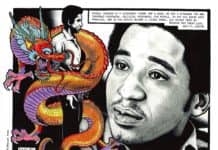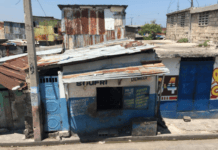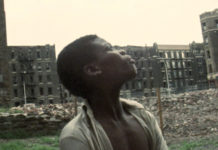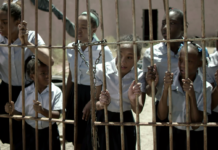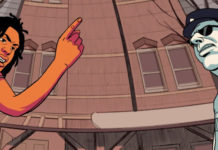
by The People’s Minister of Information JR
“Out of Chaos” is a documentary about the dynamic and resilient visual arts scene in Haiti. Having had the experience of hanging with artists and organizers from different parts of the Caribbean Island nation on my two visits, I think that this is an important film because it puts a lens on the beauty of the Haitian people instead of just depicting the desperate, impoverished state in which the U.S., France, Canada and the other imperialist European powers have reduced Haitian life to.
I interviewed filmmaker Paschal Giacomini about his film “Out of Chaos,” which is selected to screen at the SF Black Film Fest Sunday, 2:15 p.m., in the Buriel Clay Theater in the African American Art and Culture Complex, 762 Fulton St.
M.O.I. JR: What made you want to do a film documenting the visual artists of Port au Prince? What is the image of Haiti that you are combating and up against?
Pascal Giacomini: I am a metal sculptor, and I spent a month in this poorest of slums, participating in an art event called the 2nd Ghetto Biennale, where I created three large-scale sculptures with whatever materials I found on the ground, like the local artists do. My pieces were part of a group show at the end of my stay.
As I was preparing my sculptures for the opening of the biennale, I documented life in the ghetto for myself, and then expanded on it by interviewing multiple Haitian artists – those notable and prosperous, those successful but still poor – in my mission to fathom what sustains them despite the daily hardships of life in Port au Prince.
People think of Haiti only in terms of poverty, political instability and the earthquake. But there is a tremendous artistic energy and a history of the rich arts culture there too, and I wanted to get that out.
M.O.I. JR: What effect did the work of these artists have on you? What made you want to profile these artists specifically?
Pascal Giacomini: After a month of working there, my creative process evolved in a new direction. They were my hosts and friends, and I admire that they can do their work in such a harsh environment. They inspired me.
M.O.I. JR: What was the process like for creating this film from inception to post production? Was the post production done in the United States?
Pascal Giacomini: Did most of it by myself, from shooting to sound recording, editing – I had to learn FCP7 – and then learn how to cut, tell a story, research the art, do subtitles etc. A slog of seven years, but here I am now, with up to five festivals screening my film.
M.O.I. JR: Is there a difference in trying to be true to a story when the nation being depicted speaks another language and has a vastly different culture?
Pascal Giacomini: I am a Frenchman living in LA for 30 years and I am married into a Haitian family, so I have been to Haiti a dozen times over the years to visit family and work. I speak French and understand enough Creole to get by. Most artists speak French or some French, fluent English or some English and Creole of course. We got by.
M.O.I. JR: Now that this film is done, what are your future plans?
Pascal Giacomini: I just created the Queen’s Metal band, an installation of seven large musical sculptures holding electric guitars, straight up basses and drums that I wholly fabricated and that have been performed by the Louisiana Love Act, a New Orleans funk-influenced band. I am looking to have the installation be performed on the road, and making a movie out of the performance.
M.O.I. JR: Can you speak about the poverty and resilience of the Haitian artists and people in general?
Pascal Giacomini: Well, they just have no choice but to be resilient since they have to make sure their families have food on the table, so they just keep on going. The artists’ drive is very powerful in Haiti, a country where it seems that there’s a new artist born every day.
M.O.I. JR: What do you hope people get from this film?
Pascal Giacomini: That they will change their perspective on the Haitian people, and develop an appreciation for the profusion of art that comes out of this unlikely place.
M.O.I. JR How can people stay up with your work?
Pascal Giacomini: www.pascalgiacomini.com
The People’s Minister of Information JR Valrey, journalist, author and filmmaker, can be reached at blockreportradio@gmail.com or on Facebook. And tune in to BlockReportTV on YouTube. The 2019 San Francisco Black Film Festival runs June 13-16; learn more at SFBFF.org.

 Store
Store




